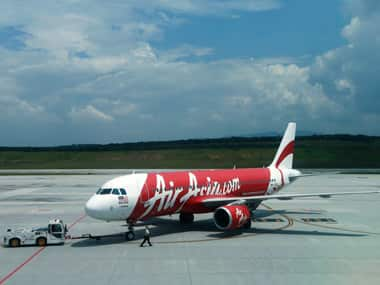If Civil Aviation Minister Ajit Singh has his way, Tata-Singapore Airlines and AirAsia India may be able to launch international flights from day one. And incumbent airlines like IndiGo, SpiceJet, Air India may have to eat crow.
At the fag end of his tenure as minister, Singh has finally circulated a Cabinet Note scrapping the 5/20 rule, something the incumbent airlines had lobbied hard against. It is possible that the last Cabinet meeting of the UPA government will take it up this week and if it is passed, then the current restriction on domestic airlines will be lifted.
Sources told Firstbiz this evening that the Cabinet may discuss the proposal on Wednesday. If it is abolished, GoAir will also benefit besides the two startup airlines since GoAir has completed five years of operations but does not have a fleet of 20 aircraft yet.
[caption id=“attachment_77220” align=“alignleft” width=“380”]  Reuters[/caption]
As of now, domestic airlines must complete five years of internatinal operations before getting permission to fly abroad. They must also have a 20-aircraft fleet before this permission is granted. All domestic airlines but GoAir have had to comply with this restriction when there was no such stipulation for foreign airlines wanting to mount flights to India. The 5/20 rule has many times been described as the most antiquated rule in Indian aviation and has no parallel anywhere in the world.
The 5/20 rule has historically been seen as needless restriction on Indian airlines. When startups such as Air Arabia and AirAsia Bhd were allowed to fly into India by their respective Governments, it obviously put our airlines at a disadvantage because of the five year domestic operation clause. These airlines were not restricted by any such conditions by their respective Governments.
The ministries of finance and corporate affairs as well as the Planning Commission have repeatedly stated that there is no logic to the 5/20 policy.
In January last year, a study commissioned by the ministry of corporate affairs unequivocally said the barriers to international operations were anti-competitive because they limited the number or range of suppliers and reduced their ability and incentive to compete.
Fleet size requirements incur a large start-up cost for domestic airlines and the policy also left domestic operators worse off at a time when foreign operators’ services to and from India were steadily expanding. Aviation consultancy CAPA, other aviation experts have also repeatedly condemned the 5/20 rule. CAPA said earlier this year that such a policy has enabled foreign airlines to capture a larger share of theinternational market at the expense of home carriers.
International operations are crucial for airlines which are looking for ways to rationalise their cost base. India already has one of the highest cost of operation for airlines, thanks to a heavily taxed jet fuel, so that airlines were compelled to pick up cheaper fuel abroad to manage costs.Also, this way their aircraft are better utilised, again bringing in gains.


)
)
)
)
)
)
)
)
)



